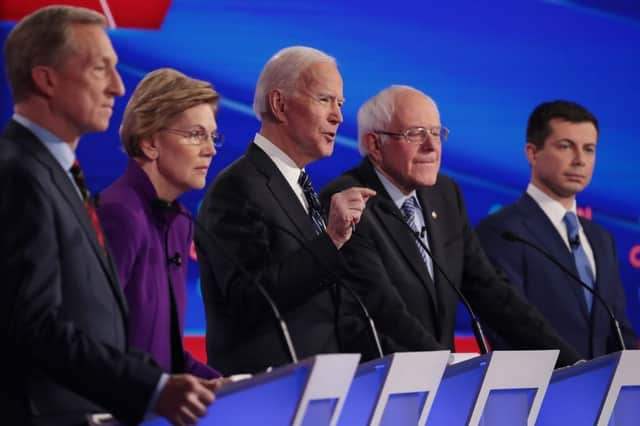Here's everything you need to know about the Iowa caucuses ahead of the 2020 US presidential election


The race to decide Democratic and Republican presidential candidates gets underway on Monday with the Iowa caucuses.
Democrat and Republican voters will vote for their preferred nominee in the race to the White House, with Donald Trump's route all but clear to run as the Republican candidate in November 2020.
Advertisement
Hide AdAdvertisement
Hide AdThe democrat race is wide open, however, with Bernie Sanders, Joe Biden, Elizabeth Warren and Pete Buttigieg seemingly in with a shout of clinching a victory in the Midwestern state and earning a crucial momentum boost in the race to be named the Democratic candidate.


When are the Iowa caucuses?
The Iowa Caucses get underway at 8pm (ET) on Monday, February 3 - that's 1am (GMT) February 4. Results should start filtering through 45 minutes after they get underway.
How do the Iowa caucuses work?


What is a caucus vote?
A meeting at which local members of a political party register their preference among candidates running for office or select delegates to attend a convention.
Both parties hold their caucuses differently.
In the case of the Democrats each precinct divides its delegate seats among the candidates in proportion to caucus goers' votes.
Advertisement
Hide AdAdvertisement
Hide AdThe Democrats gather at 'caucus sites' such as a school or church, with voters gathering in a particular area of the site to show support for a candidate, e.g. Sanders supporters would gather in one corner, while Biden backers would gather in an opposite corner. Supporters then spend 30 minutes attempting to convince opposition and undecided voters to join their group.
NEW YORK, NY - APRIL 5: Democratic presidential candidate U.S. Sen. Bernie Sanders (I-VT) speaks at the National Action Network's annual convention, April 5, 2019 in New York City. A dozen 2020 Democratic presidential candidates are speaking at the organization's convention this week. Founded by Rev. Al Sharpton in 1991, the National Action Network is one of the most influential African American organizations dedicated to civil rights in America. (Photo by Drew Angerer/Getty Images)
Candidates must earn at least 15% of support to achieve viability, with supporters of candidates who fail to reach this threshold obliged to '"realign" and throw backing behind a viable candidate or team up with another non-viable candidate.
The "the final expression of preference" after realignment will be used to decide which candidates received delegates.
Advertisement
Hide AdAdvertisement
Hide AdThe number of delegates awarded at each caucus site is decided by a mathematical formula.
Republicans differ from Democrats in that they simply carry out a secret ballot.
How do we know who wins?
The "winner" of the Iowa caucuses will be the candidate who accrues the most number of state delegates after the realignment process.
Who's in contention?
Elizabeth Warren was the first Democrat
There are eleven people still in the running for the Democratic candidacy.
Advertisement
Hide AdAdvertisement
Hide AdMichael Bennet US Senator from ColoradoJoe Biden Former Vice PresidentPete Buttigieg Former Mayor of South Bend, IndianaMichael Bloomberg Former Mayor of New York CityJohn Delaney Former U.S. Representative from MarylandTulsi Gabbard US Representative from HawaiiAmy Klobuchar US Senator from MinnesotaDeval Patrick Former Governor of MassachusettsBernie Sanders US Senator from VermontTom Steyer Founder of Farallon Capital ManagementElizabeth Warren US Senator from MassachusettsAndrew Yang Founder of Venture for America
Who's the favourite?
Bernie Sanders has emerged as the early front runner in recent weeks. The 78-year-old lost out o Hillary Clinton four years ago, but could conceivably claim both the Iowa caucuses and the New Hampshire primary and solidify his place as early favourite.
A win for former vice-president Joe Biden could help to provide a much-needed boost to his campaign which has struggled with limited campaign resources.
Pete Buttigieg or Amy Klobuchar could spring a surprise and set the tone for a long-winded candidate selection.
Odds
Advertisement
Hide AdAdvertisement
Hide AdBernie Sanders (4/7)Joe Biden (9/4)Pete Buttigieg (7/1)Elizabeth Warren (10/1)Amy Klobuchar (33/1)Andrew Yang (33/1)
How important are the Iowa caucuses?
The Iowa vote is seen as a political litmus test providing an indicator of the frontrunner(s) for the candidacy, with Donald Trump, Ted Cruz and Marco Rubio outlining themselves as the only real contenders for the Republican vote in 2016.
The Iowa caucuses can be vital in providing early momentum and shaping voters in other states' perception of running candidates.
When it comes to selecting Democratic candidates, Iowa has traditionally been accurate in providing a prediction of the future presidential candidate, with previous candidates Hillary Clinton, Barack Obama, John Kerry and Al Gore all winning the Iowa caucuses.
Is there a Republican primary?
Advertisement
Hide AdAdvertisement
Hide AdIn February 2019, the Republican National Committee voted to provide undivided support to President Trump. Several states have decided to cancel their primaries and caucuses, but the process is largely irrelevant.
